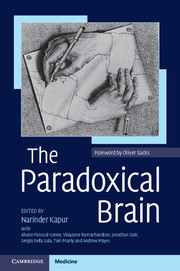Book contents
- Frontmatter
- Contents
- Acknowledgements
- Preface
- Foreword
- Author affiliations
- Abbreviations
- 1 The paradoxical nature of nature
- 2 Paradoxical effects of sensory loss
- 3 Paradoxical functional facilitation and recovery in neurological and psychiatric conditions
- 4 Paradoxes in neurorehabilitation
- 5 The paradoxical self
- 6 Paradoxical psychological functioning in early child development
- 7 Cognitive ageing: a positive perspective
- 8 Paradoxes of learning and memory
- 9 The paradox of human expertise: why experts get it wrong
- 10 Paradoxes in Parkinson's disease and other movement disorders
- 11 Paradoxical phenomena in epilepsy
- 12 Paradoxical creativity and adjustment in neurological conditions
- 13 Paradoxical functional facilitation with noninvasive brain stimulation
- 14 Unexpected benefits of allergies and cigarette smoking: two examples of paradox in neuroepidemiology
- 15 The paradox of autism: why does disability sometimes give rise to talent?
- 16 Paradoxes in creativity and psychiatric conditions
- 17 The paradox of psychosurgery to treat mental disorders
- 18 The paradox of electroconvulsive therapy
- 19 Paradoxes of comparative cognition
- 20 Paradoxical phenomena in brain plasticity
- 21 Immature neurons in the adult brain. Breaking all the rules
- 22 The paradoxical hippocampus: when forgetting helps learning
- 23 Paradoxical effects of drugs on cognitive function: the neuropsychopharmacology of the dopamine and other neurotransmitter systems
- 24 The paradoxical brain – so what?
- Index
- References
8 - Paradoxes of learning and memory
Published online by Cambridge University Press: 05 December 2011
- Frontmatter
- Contents
- Acknowledgements
- Preface
- Foreword
- Author affiliations
- Abbreviations
- 1 The paradoxical nature of nature
- 2 Paradoxical effects of sensory loss
- 3 Paradoxical functional facilitation and recovery in neurological and psychiatric conditions
- 4 Paradoxes in neurorehabilitation
- 5 The paradoxical self
- 6 Paradoxical psychological functioning in early child development
- 7 Cognitive ageing: a positive perspective
- 8 Paradoxes of learning and memory
- 9 The paradox of human expertise: why experts get it wrong
- 10 Paradoxes in Parkinson's disease and other movement disorders
- 11 Paradoxical phenomena in epilepsy
- 12 Paradoxical creativity and adjustment in neurological conditions
- 13 Paradoxical functional facilitation with noninvasive brain stimulation
- 14 Unexpected benefits of allergies and cigarette smoking: two examples of paradox in neuroepidemiology
- 15 The paradox of autism: why does disability sometimes give rise to talent?
- 16 Paradoxes in creativity and psychiatric conditions
- 17 The paradox of psychosurgery to treat mental disorders
- 18 The paradox of electroconvulsive therapy
- 19 Paradoxes of comparative cognition
- 20 Paradoxical phenomena in brain plasticity
- 21 Immature neurons in the adult brain. Breaking all the rules
- 22 The paradoxical hippocampus: when forgetting helps learning
- 23 Paradoxical effects of drugs on cognitive function: the neuropsychopharmacology of the dopamine and other neurotransmitter systems
- 24 The paradoxical brain – so what?
- Index
- References
Summary
Summary
We explore 12 paradoxes of learning, memory and knowing in our chapter. These are mysteries in which subjective experience – what we think we know or remember – does not correspond to objective facts. In some cases, we hold false memories: we are utterly confident in our memories that events happened one way, but they did not. Another example is hindsight bias: we may believe that we knew (after the fact) how an event would turn out, but controlled experiments show people cannot predict the event. Another category of illusion occurs with learning. Often students judge one method of learning to be superior to a second method, but their actual performance shows the reverse to be true. The paradox of interference creates other puzzles: when people try to remember similar events, they will often confuse one for another. We discuss 12 paradoxes and their implications for cognitive functioning. Some of these errors may implicate cognitive strategies that we use because they often lead to correct answers in many situations, but can produce errors in other instances.
Introduction
Psychologists love mysteries and paradoxes. They always have, they always will. There is nothing surprising here; all people like paradoxes and puzzles. Look at Figure 8.1 and ask yourself which surface of the two boxes is longer, the one on the left or the one on the right? Every person naïve to the situation will answer the one on the left. However, the two surfaces are exactly congruent. They are the same.
- Type
- Chapter
- Information
- The Paradoxical Brain , pp. 151 - 176Publisher: Cambridge University PressPrint publication year: 2011
References
- 3
- Cited by



